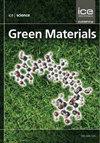Optimization of water-binding capacity and water removal from oil by eggplant stems using response surfaces methodology
IF 2
4区 材料科学
Q4 GREEN & SUSTAINABLE SCIENCE & TECHNOLOGY
引用次数: 0
Abstract
Eggplant stems are among the most produced organic wastes. Unfortunately, the burning and irregular storage of these eggplant stems outdoors causes serious damage to both global air pollution and environmental pollution. Environmental impacts can be minimized by recycling eggplant stems, turning them into valuable products, and using them as valuable additives. In this study, water-binding capacity (WBC) and water-binding capacity in oil (WBCO) potential of eggplant stems were investigated. At the first step, optimization alkaline-treated of eggplant stems carried out. Alkaline-treated optimization parameters such as NaOH concentration (0.05, 0.125, and 0.2 M), temperature (20, 40, and 60 °C), and reaction time (30, 90, and 150 minutes) was investigated using response surface methodology (RSM). In the second step, both water holding capacity and water holding capacity in oil tests were performed for each experimental set. As a result of the experiments, 30.64 %, and 98.20% capacity efficiency respectively WBC, and WBOC were obtained for 0.125 M NaOH concentration, 60 °C temperature, and 150 minutes reaction time. In addition, eggplant stems have demonstrated the ability to effectively retain water for up to 5 cycles. The high water-binding capacity of eggplant stems in oil after alkali treatment shows that it can be a suitable and inexpensive candidate, especially for biodiesel purification and methane production.响应面法优化茄子茎的脱水能力
茄子茎是产生最多的有机废物之一。不幸的是,这些茄子茎的焚烧和不规范的户外储存对全球空气污染和环境污染造成了严重的破坏。通过回收茄子茎,将其转化为有价值的产品,并将其用作有价值的添加剂,可以将对环境的影响降到最低。研究了茄子茎部的水结合力(WBC)和含油水结合力(WBCO)潜力。首先,对茄茎碱处理进行了优化。采用响应面法(RSM)考察了碱处理的优化参数,如NaOH浓度(0.05、0.125和0.2 M)、温度(20、40和60℃)和反应时间(30、90和150分钟)。第二步,对每个实验集进行持水能力和含油测试的持水能力。结果表明,在NaOH浓度为0.125 M、反应温度为60℃、反应时间为150 min的条件下,WBC和WBOC的容量效率分别为30.64%和98.20%。此外,茄子茎已经证明能够有效地保持水分长达5个周期。碱处理后的茄子茎在油中的高结水能力表明它是一种合适且廉价的候选材料,特别是用于生物柴油净化和甲烷生产。
本文章由计算机程序翻译,如有差异,请以英文原文为准。
求助全文
约1分钟内获得全文
求助全文
来源期刊

Green Materials
Environmental Science-Pollution
CiteScore
3.50
自引率
15.80%
发文量
24
期刊介绍:
The focus of Green Materials relates to polymers and materials, with an emphasis on reducing the use of hazardous substances in the design, manufacture and application of products.
 求助内容:
求助内容: 应助结果提醒方式:
应助结果提醒方式:


